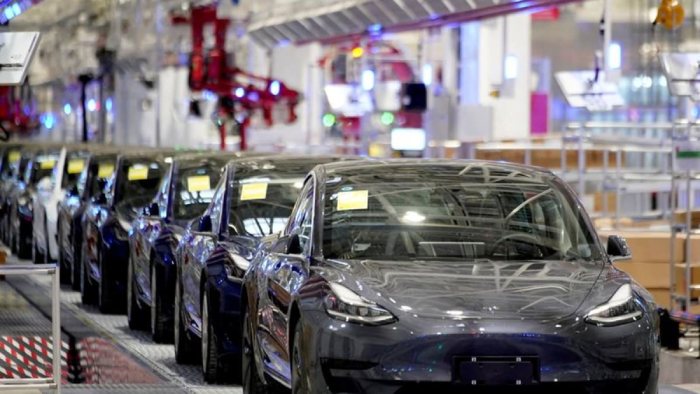Tesla announced on Sunday that it delivered 308,600 electric vehicles in the fourth quarter of 2021, shattering both the company’s previous single-quarter record and analysts’ forecasts. During the same time span, the automaker produced a total of 305,840 totally electric vehicles.
Tesla delivered 936,172 vehicles for the full year, up 87 percent from 2020, when it announced its first annual profit on 499,647 deliveries.
Tesla’s previous highest quarter, the third quarter of 2021, had 241,300 vehicles produced.
According to FactSet, Wall Street analysts predicted Tesla deliveries of 267,000 in the fourth quarter and 897,000 for the entire year of 2021.
Deliveries are the closest approximation of Tesla CEO Elon Musk’s electric car company’s announced sales.
Tesla’s higher-priced Model S and X vehicles, as well as its lower-priced Model 3 and Y vehicles, are combined in its delivery counts. The firm does not break out its sales or production numbers by region.
In 2021, deliveries of Tesla’s flagship Model S sedan and Model X falcon wing SUV accounted for slightly under 3% of the company’s total deliveries. In the fourth quarter of 2021, Tesla delivered 296,850 Model 3 and Model Y vehicles, for a total of 911,208 for the year.
Tesla produces Model 3 and Model Y vehicles in Shanghai and Fremont, California, respectively, but only the Model X and S in Fremont.
Shrugging off shortages
Musk bemoaned a year marked by supply chain issues that made it impossible to secure enough microchips and other unspecified items at Tesla’s 2021 annual shareholder meeting.
Tesla was able to increase vehicle deliveries during the second year of a global coronavirus epidemic by ramping up production at its first overseas factory in Shanghai and making technical improvements to the cars it produces in Fremont, California, so that it could eliminate some parts entirely.
Tesla, for example, said in May that radar sensors would be removed from Model 3 and Model Y vehicles made for North American consumers. Tesla’s driving assistance functions, such as traffic-adjusted cruise control and automated lane-keeping, are now enabled by a camera-based system in those cars.
Looking forward
Musk has stated that he intends substantially increase Tesla’s yearly vehicle sales to 20 million in the following nine years. Tesla plans to begin production of the Model Y crossover this year at its new factory in Austin, Texas, in order to meet that demand. After that, it plans to construct a manufacturing in Brandenburg, Germany.
The company’s headquarters were recently relocated to Texas. Tesla made the plan official in early December, after the CEO announced it in October.
“Giga Texas is a $10B+ investment over time, generating at least 20k direct & 100k indirect jobs,” Musk tweeted last month on Twitter, where he has 68.4 million followers. Tesla expects to invest $1.6 billion on the Austin, Texas manufacturing in its first phase, according to public records.
Despite its progress and goals in Texas, Tesla has postponed plans to begin mass production of its Cybertruck, an angular pickup, until 2023. The company’s Semi and redesigned Roadster are also currently in development.
Prospects for the Industry
In the United States and much of the rest of the world, the firm now dominates battery electric car sales. However, as competitors release completely electric vehicles of their own, it is anticipated to lose market share overall.
Toyota, for example, has stated that it will invest $35 billion to produce 30 battery-electric vehicles by 2030. Rivian just started shipping its battery-electric pickup truck and SUV. After getting 200,000 requests, Ford stopped taking reservations for its F-150 Lightning electric pickup truck.
Tesla’s sales are likely to continue to rise in tandem with total electric car demand, which is fueled in part by environmental regulations.
In an effort to reduce air pollution from transportation, governments such as California and New York have set a deadline on the sale of most gas-powered automobiles, following the lead of several European countries and cities.
According to Alix Partners’ forecasts, by 2030, around 24% of new vehicles sold worldwide will be entirely electric.
- Melon Music Awards 2025: Full Nominees List Led by G-Dragon and Jennie - December 16, 2025
- FCS Final Four 2025: Semifinal Matchups, Start Times and Broadcast Details - December 16, 2025
- National Champions: Washington Huskies Win First-Ever 2025 NCAA DI Men’s Soccer Title - December 16, 2025




